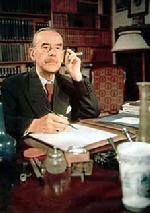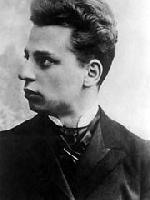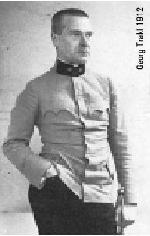E. M. Forster, J.D. Salinger
Der englische Schriftsteller Edward Morgan Forster wurde am 1. Januar 1879 in London geboren. Forsters Kindheit und ein großer Teil seines Lebens als Erwachsener wurden von seiner Mutter, Anne Clara Wichelo Forster, und seinen Tanten dominiert. Er besuchte zuerst die Tonbridge School, wo er sehr stark unter der Grausamkeit seiner Klassenkameraden litt. Von 1897 bis 1901 studierte Forster am King´s College in Cambridge. Dort trat er der elitären Geheimgesellschaft Cambridge Apostles bei, unter deren Mitgliedern sich später einige Personen wie Roger Fry, John Maynard Keynes, Lytton Strachey und Leonard Woolf zur Bloomsbury Group zusammenschlossen, deren Mitglied Forster in den 1920er und 1930er Jahren war. Sein erster Roman, Where Angels Fear To Tread, erschien 1905. Im folgenden Jahr hielt er Vorlesungen über italienische Kunst und Geschichte am Cambridge Local Lectures Board. The Longest Journey erschien 1907, gefolgt von A Room With A View (1908), das teilweise auf Forsters Erinnerungen und Erfahrungen aus seinen ausgedehnten Italienreisen beruht. Während der Vorkriegsjahre schrieb Forster auch mehrere Kurzgeschichten, die in „The Celestial Omnibus“ (1914) veröffentlicht wurden. Nach Howard's End (1910), begann Forster mit einem neuen Roman, der ein damaliges Tabuthema behandelte: Homosexualität. Maurice entstand in den Jahren 1913/1914, wurde von Forster mehrmals revidiert und 1971 postum veröffentlicht. In den Jahren von 1912 bis 1913 reiste Forster nach Indien und arbeitete anschließend bis 1915 für die National Gallery in London. 1921 kehrte Forster nach Indien zurück, wo er als Privatsekretär für den Maharaja von Dewas arbeitete. In Indien spielt auch Forsters Meisterwerk A Passage To India (1924), ein Porträt des Landes unter britischer Herrschaft. Es war Forsters letzter Roman.
Aus: Where Angels Fear to Tread
„They were all at Charing Cross to see Lilia off--Philip, Harriet, Irma, Mrs. Herriton herself. Even Mrs. Theobald, squired by Mr. Kingcroft, had braved the journey from Yorkshire to bid her only daughter good-bye. Miss Abbott was likewise attended by numerous relatives, and the sight of so many people talking at once and saying such different things caused Lilia to break into ungovernable peals of laughter.
"Quite an ovation," she cried, sprawling out of her first-class carriage. "They'll take us for royalty. Oh, Mr. Kingcroft, get us foot-warmers."
The good-natured young man hurried away, and Philip, taking his place, flooded her with a final stream of advice and injunctions--where to stop, how to learn Italian, when to use mosquito-nets, what pictures to look at. "Remember," he concluded, "that it is only by going off the track that you get to know the country. See the little towns--Gubbio, Pienza, Cortona, San Gemignano, Monteriano. And don't, let me beg you, go with that awful tourist idea that Italy's only a museum of antiquities and art. Love and understand the Italians, for the people are more marvellous than the land."
"How I wish you were coming, Philip," she said, flattered at the unwonted notice her brother-in-law was
giving her.
"I wish I were." He could have managed it without great difficulty, for his career at the Bar was not so intense as to prevent occasional holidays. But his family disliked his continual visits to the Continent, and he himself often found pleasure in the idea that he was too busy to leave town."
Edward Morgan Forster (1. Januar 1879 – 7. Juni 1970)
Der amerikanische Schriftsteller Jerome David Salinger wurde am 1. Januar 1919 in New York geboren. Er besuchte die private McBurney School in Manhattan und wurde anschließend von 1934 bis 1936 an der Valley Forge Military Academy in Wayne/Pennsylvania ausgebildet. Als Verfasser von Filmkritiken und Herausgeber der Kadettenzeitschrift Crossed Sabres unternahm er dort erste schriftstellerische Versuche. 1937 hielt er sich fünf Monate in Europa auf. 1938 immatrikulierte er sich am Ursinus College, Collegeville/Pennsylvania, wo er daneben als Theaterkritiker und Kolumnist des Ursinus Weekly arbeitete. 1939 wechselte er an die Columbia University, New York, und veröffentlichte in dem einflussreichen Story-Magazin 1940 seine erste Kurzgeschichte. Das College verließ Salinger ohne Abschluss. 1942 trat er in die US-Armee ein und nahm von Invasionsbeginn bis Kriegsende an fünf Feldzügen in Frankreich teil. Sein berühmtestes Werk Der Fänger im Roggen (The Catcher in the Rye, 1951) verhalf Salinger zu Weltruhm. Obwohl Salinger nur einen Roman und 35 Kurzgeschichten geschrieben hat, gilt er bis heute als einer der meistgelesenen und meistbesprochenen amerikanischen Autoren der Nachkriegszeit Salinger lebt seit Jahrzehnten sehr zurückgezogen und hat seit 1965, als die Geschichte Hapworth 16, 1924 im New Yorker erschien, nichts mehr veröffentlicht.
Aus: The Laughing Man
“When we got out of the bus, Mary Hudson stuck right with us. I'm sure that by the time we reached the baseball field there was on every Comanche's face a some-girls-just-don't-know-when-to-go-home look. And to really top things off, when another Comanche and I were flipping a coin to decide which team would take the field first, Mary Hudson wistfully expressed a desire to join the game. The response to this couldn't have been more clean-cut Where before we Comanches had simply stared at her femaleness, we now glared at it. She smiled back at us. It was a shade disconcerting. Then the Chief took over, revealing what had formerly been a well-concealed flair for incompetence. He took Mary Hudson aside, just out of earshot of the Comanches, and seemed to address her solemnly, rationally. At length, Mary Hudson interrupted him, and her voice was perfectly audible to the Comanches. "But I do," she said. "I do, too, want to play!" The Chief nodded and tried again. He pointed in the direction of the infield, which was soggy and pitted. He picked up a regulation bat and demonstrated its weight. "I don't care," Mary Hudson said distinctly, "I came all the way to New York - to the dentist and everything - and I'm gonna play." The Chief nodded again but gave up. He walked cautiously over to home plate, where the Braves and the Warriors, the two Comanche teams, were waiting, and looked at me. I was captain of the Warriors. He mentioned the name of my regular center fielder, who was home sick, and suggested that Mary Hudson take his place. I said I didn't need a center fielder. The Chief asked me what the hell did I mean I didn't need a center fielder. I was shocked. It was the first time I had heard the Chief swear. What's more, I could feel Mary Hudson smiling at me. For poise, I picked up a stone and threw it at a tree.
We took the field first. No business went out to center field the first inning. From my position on first base, I glanced behind me now and then. Each time I did, Mary Hudson waved gaily at me. She was wearing a catcher's mitt, her own adamant choice. It was a horrible sight.
Mary Hudson batted ninth on the Warriors' lineup. When I informed her of this arrangement, she made a little face and said, "Well, hurry up, then." And as a matter of fact we did seem to hurry up. She got to bat in the first inning. She took off her beaver coat - and her catcher's mitt - for the occasion and advanced to the plate in a dark-brown dress. When I gave her a bat, she asked me why it was so heavy. The Chief left his umpire's position behind the pitcher and came forward anxiously.“
J.D. Salinger (New York, 1. Januar 1919)
Aus: Where Angels Fear to Tread
„They were all at Charing Cross to see Lilia off--Philip, Harriet, Irma, Mrs. Herriton herself. Even Mrs. Theobald, squired by Mr. Kingcroft, had braved the journey from Yorkshire to bid her only daughter good-bye. Miss Abbott was likewise attended by numerous relatives, and the sight of so many people talking at once and saying such different things caused Lilia to break into ungovernable peals of laughter.
"Quite an ovation," she cried, sprawling out of her first-class carriage. "They'll take us for royalty. Oh, Mr. Kingcroft, get us foot-warmers."
The good-natured young man hurried away, and Philip, taking his place, flooded her with a final stream of advice and injunctions--where to stop, how to learn Italian, when to use mosquito-nets, what pictures to look at. "Remember," he concluded, "that it is only by going off the track that you get to know the country. See the little towns--Gubbio, Pienza, Cortona, San Gemignano, Monteriano. And don't, let me beg you, go with that awful tourist idea that Italy's only a museum of antiquities and art. Love and understand the Italians, for the people are more marvellous than the land."
"How I wish you were coming, Philip," she said, flattered at the unwonted notice her brother-in-law was
giving her.
"I wish I were." He could have managed it without great difficulty, for his career at the Bar was not so intense as to prevent occasional holidays. But his family disliked his continual visits to the Continent, and he himself often found pleasure in the idea that he was too busy to leave town."
Edward Morgan Forster (1. Januar 1879 – 7. Juni 1970)
Der amerikanische Schriftsteller Jerome David Salinger wurde am 1. Januar 1919 in New York geboren. Er besuchte die private McBurney School in Manhattan und wurde anschließend von 1934 bis 1936 an der Valley Forge Military Academy in Wayne/Pennsylvania ausgebildet. Als Verfasser von Filmkritiken und Herausgeber der Kadettenzeitschrift Crossed Sabres unternahm er dort erste schriftstellerische Versuche. 1937 hielt er sich fünf Monate in Europa auf. 1938 immatrikulierte er sich am Ursinus College, Collegeville/Pennsylvania, wo er daneben als Theaterkritiker und Kolumnist des Ursinus Weekly arbeitete. 1939 wechselte er an die Columbia University, New York, und veröffentlichte in dem einflussreichen Story-Magazin 1940 seine erste Kurzgeschichte. Das College verließ Salinger ohne Abschluss. 1942 trat er in die US-Armee ein und nahm von Invasionsbeginn bis Kriegsende an fünf Feldzügen in Frankreich teil. Sein berühmtestes Werk Der Fänger im Roggen (The Catcher in the Rye, 1951) verhalf Salinger zu Weltruhm. Obwohl Salinger nur einen Roman und 35 Kurzgeschichten geschrieben hat, gilt er bis heute als einer der meistgelesenen und meistbesprochenen amerikanischen Autoren der Nachkriegszeit Salinger lebt seit Jahrzehnten sehr zurückgezogen und hat seit 1965, als die Geschichte Hapworth 16, 1924 im New Yorker erschien, nichts mehr veröffentlicht.
Aus: The Laughing Man
“When we got out of the bus, Mary Hudson stuck right with us. I'm sure that by the time we reached the baseball field there was on every Comanche's face a some-girls-just-don't-know-when-to-go-home look. And to really top things off, when another Comanche and I were flipping a coin to decide which team would take the field first, Mary Hudson wistfully expressed a desire to join the game. The response to this couldn't have been more clean-cut Where before we Comanches had simply stared at her femaleness, we now glared at it. She smiled back at us. It was a shade disconcerting. Then the Chief took over, revealing what had formerly been a well-concealed flair for incompetence. He took Mary Hudson aside, just out of earshot of the Comanches, and seemed to address her solemnly, rationally. At length, Mary Hudson interrupted him, and her voice was perfectly audible to the Comanches. "But I do," she said. "I do, too, want to play!" The Chief nodded and tried again. He pointed in the direction of the infield, which was soggy and pitted. He picked up a regulation bat and demonstrated its weight. "I don't care," Mary Hudson said distinctly, "I came all the way to New York - to the dentist and everything - and I'm gonna play." The Chief nodded again but gave up. He walked cautiously over to home plate, where the Braves and the Warriors, the two Comanche teams, were waiting, and looked at me. I was captain of the Warriors. He mentioned the name of my regular center fielder, who was home sick, and suggested that Mary Hudson take his place. I said I didn't need a center fielder. The Chief asked me what the hell did I mean I didn't need a center fielder. I was shocked. It was the first time I had heard the Chief swear. What's more, I could feel Mary Hudson smiling at me. For poise, I picked up a stone and threw it at a tree.
We took the field first. No business went out to center field the first inning. From my position on first base, I glanced behind me now and then. Each time I did, Mary Hudson waved gaily at me. She was wearing a catcher's mitt, her own adamant choice. It was a horrible sight.
Mary Hudson batted ninth on the Warriors' lineup. When I informed her of this arrangement, she made a little face and said, "Well, hurry up, then." And as a matter of fact we did seem to hurry up. She got to bat in the first inning. She took off her beaver coat - and her catcher's mitt - for the occasion and advanced to the plate in a dark-brown dress. When I gave her a bat, she asked me why it was so heavy. The Chief left his umpire's position behind the pitcher and came forward anxiously.“
J.D. Salinger (New York, 1. Januar 1919)
froumen - 1. Jan, 13:46



